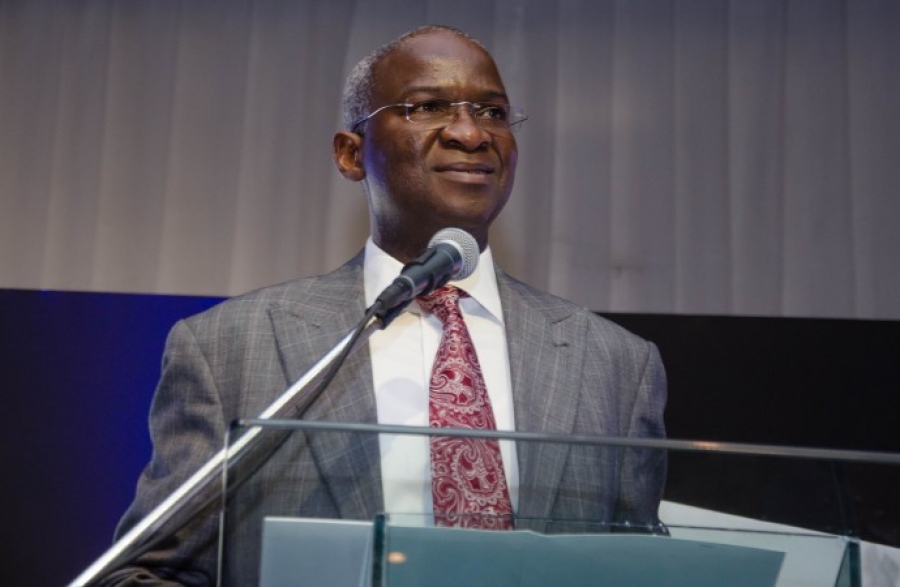- Lagos-Ibadan Road: Fashola Wants Full Funding by FG
The Minister of Power, Works and Housing, Mr. Babatunde Fashola, told the House of Representatives on Tuesday that adequate funding by the Federal Government remained the most viable option to complete the Lagos-Ibadan Expressway.
He said this was also applicable to the 2nd Niger Bridge.
Fashola argued that the two projects were “very critical” to the country’s economy and could not be left to the lengthy processes involved in negotiating a Public-Private Partnership arrangement as a funding alternative.
To achieve adequate funding through budgetary appropriation, the minister noted that the support and understanding of the National Assembly was priceless.
The minister warned that the delay in the completion of the Lagos-Ibadan Expressway could begin to impact negatively on the economy in the coming years.
“In a few years’ time, our economy will feel the impact of the non-completion of this road. It is in our best interests to give it the desired attention,” he stated.
Fashola appeared in Abuja before the House Committee on Works chaired by Mr. Toby Okechukwu.
The committee is investigating the “nature of the contract and/or concession arrangement on the Second Niger Bridge and the Lagos-Ibadan Expressway.”
The House had resolved to probe the funding of the two projects, following conflicting accounts over an existing PPP and direct budgetary funding.
But the minister explained that the PPP arrangement he met when he assumed office in 2015 was not leading the country anywhere.
He stated that it was beset by litigation, which meant that the projects would continue to be stalled had he not stepped in to advise the government to continue to fund them.
Fashola added that while a PPP would seem attractive, he had come to realise that developers in Nigeria did not have the financial capacity to support major projects like the Lagos-Ibadan Expressway and the Second Niger Bridge.
He told the committee that this was the reason why he advised the government in 2015 to take full control of the funding, pending when all the disputes over the concession would be resolved.
The minister said this was the reason N31bn was put in the 2017 budget to speed up work on the Lagos-Ibadan Expressway, but regretted that it was the same National Assembly that slashed it to N10bn.
Fashola said, “In 2017, we put N31bn there, but it was scaled down to N10bn, perhaps because it was thought that the money was too big for a section of the country.
“Promises were made (by virement) that the money would be returned, but till date, no money has come to us.”
For 2018, the minister said N9bn was proposed for the shorter section of the road being handled by Julius Berger.
He added that another N11.5bn was proposed for the longer section where the RCC was working, bringing the total proposal for 2018 to N20.5bn.
On the Second Niger Bridge, Fashola told the committee that N5.05bn was proposed for 2018, though he confirmed that no PPP funding arrangement had been finalised for the project by the government.
He informed the lawmakers that while a PPP arrangement signed in 2007 for the two projects seemed laudable, the truth was that it was imposed on Nigeria by the administration of former President Olusegun Obasanjo.
Fashola added, “The Infrastructure Concession and Regulatory Commission advised against the concession in 2007, but the government said you either do it or get fired.
“These were facts I got to know when I arrived on the scene in 2015. They will bring out their files and you will see. This is the truth.”
Members of the House, including Mr. Pattegi Ahman and Mr. Mohammed Bago, said they were in support of the government increasing the allocations to the Lagos-Ibadan Expressway.
The total cost of the road is put at N167bn.
Members argued that unless more money was put into the road, at the current N20.5bn per year, the project would drag for another 10 years.
“At this funding pace, it will be at least another eight years to complete the road,” Okechukwu noted.
Meanwhile, at a separate session on a bill seeking to fund the Federal Road Maintenance Agency from the Consolidated Revenue Fund, Fashola opposed the idea.
He said FERMA was already being funded through appropriation by the National Assembly, adding that all that was required was to increase the allocations in the budget.
The session was chaired by Mr. Jerry Alagbaso.

 Forex3 weeks ago
Forex3 weeks ago


 Naira2 weeks ago
Naira2 weeks ago
 Billionaire Watch2 weeks ago
Billionaire Watch2 weeks ago




 Naira2 weeks ago
Naira2 weeks ago




 Naira4 weeks ago
Naira4 weeks ago




 Naira2 weeks ago
Naira2 weeks ago


 Naira1 week ago
Naira1 week ago
 Banking Sector4 weeks ago
Banking Sector4 weeks ago






















